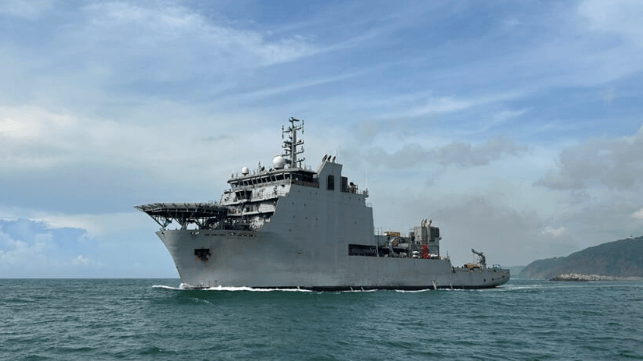Indian Navy Commissions a Mother Ship for Deep-Diving Rescue Subs

Last week, India’s Navy commissioned the new diving support vessel INS Nistar, strengthening its first responder role in the Indian Ocean region. The vessel is the first domestically designed and constructed DSV, a key milestone under the Self-Reliant India initiative (Atmanirbhar Bharat) implemented by Prime Minister Narendra Modi’s government.
Nistar is the first of the two DSVs being built by Hindustan Shipyard Limited (HSL). The order for the two DSVs (Nistar and Nipun) was placed in 2018 but the construction experienced delays during the Covid-19 pandemic. HSL concurrently launched the vessels in September 2022, with Nistar completing sea trials in May 2024.
One year later, with the commissioning of Nistar, India’s Navy has strengthened its capacity to respond to submarine emergencies within the Indian Ocean region. “INS Nistar is not just a technological asset but a crucial operational enabler. The vessel will provide critical submarine rescue support to the Indian Navy as well as to our regional partners. This will enable India to emerge as a preferred submarine rescue partner in the region,” said Chief of the Naval Staff Admiral Dinesh K Tripathi.
Nistar joined the Eastern Naval Command based in Visakhapatnam, which also houses India’s nuclear-powered submarines. Nistar has a length of 118 meters and a displacement of more than 10,000 tons. It has an endurance of around 60 days at sea and has capacity to undertake diving and salvage operations up to 300 meters in depth.
Nistar is also equipped with state-of-the-art diving equipment including Remotely Operated Vehicles (ROVs), Self-Propelled Hyperbaric Life Boat and Diving Compression Chambers. It is a “mother ship” for deep submergence rescue vehicles (DSRVs), used to rescue personnel from a submarine in distress.
Currently, Indian Navy operates two DSRVs, which were delivered under a $250 million contract signed in March 2016 with the UK firm JFD. The two DSRVs have been operating without an official mother ship. In 2021, India deployed the two vehicles to assist in the rescue of the Indonesian navy submarine KRI Nanggala-402, which went missing in Bali Strait during a military exercise. However, the rescue mission was called off before the DSRVs could be utilized.
Last year, South Africa signed a submarine rescue agreement with India, which will see the country benefit from the services of the Indian DSRVs in times of crisis. Singapore also has a similar agreement with India.
